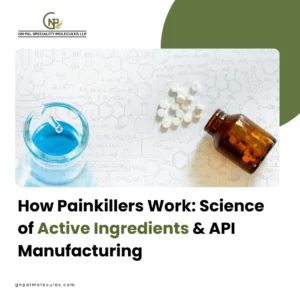
Introduction to Painkillers
What Are Painkillers?
Painkillers or analgesics are drugs that are made to eliminate pain but without leading to the loss of consciousness. They are some of the most popular drugs used worldwide. Whether a headache, a toothache, an injury from sports, or arthritis and other chronic ailments, painkillers offer comfort and enable individuals to continue their day-to-day activities. At the heart of all painkillers is something strong but frequently underappreciated the active pharmaceutical ingredient (API). This is the substance that actually suppresses or eliminates the feeling of pain.
APIs are produced all over the world, yet India is among the top providers of India API manufacturing, and corporations such as Gnpal Speciality Molecules LLP are particularly important. They are then developed into tablets, capsules, or injections that come to patients all around the globe. Through the knowledge of painkillers, we do not merely know how they are created but also see the enormous pharmacy system that makes them happen.
Why Understanding Painkillers Is Important
Painkillers are easy, but the complexity behind them is often masked by their common use. Everybody learns to swallow a pill without being aware of what it does and how it functions in the body. Learning about the science of painkillers, though, is important because it makes individuals use them responsibly. Excessive dependence on painkillers may result in medical problems like stomach ulcers, kidney injury, or even addiction in the case of opioids.
Also, being aware of APIs and speciality molecules makes us see that the advances in pharmaceutical production are increasing the efficacy and safety of drugs. As India is a pharmaceutical hub, Best Speciality Molecules LLP and Gnpal Speciality Molecules LLP are changing the way painkillers are manufactured and distributed. This makes patients and professionals aware so that they can make well-informed choices regarding the management of pain.
The Science Behind Pain
How the Body Detects Pain
Pain is the body’s natural warning system. When tissues are hurt either by a cut, burn, or internal injury they secrete pain-inducing chemicals called prostaglandins. These chemicals stimulate special nerve endings called nociceptors, which transmit messages via the spinal cord to the brain. The brain recognizes these messages as pain, warning the body to defend itself.
There are various kinds of pain acute pain (temporary, such as a sprain), chronic pain (ongoing, such as arthritis), and neuropathic pain (due to nerve damage). There are distinct mechanisms behind each kind of pain, so not all painkillers act in the same manner. For example, some drugs inhibit the production of prostaglandins, but others work in the brain to reduce pain perception.
The Role of Nerves and the Brain
The brain not only senses pain but also regulates it. Neurotransmitters like serotonin and dopamine affect the intensity of pain. Certain analgesics interfere with these pathways, decreasing sensitivity in the brain to pain messages.
Consider pain to be a radio transmission. The damage creates the broadcast, the nerves are the wires that carry it, and the brain is the receiver. Painkillers, to continue with the analogy, are like volume controls or static filters they either dampen the signal at the source, cut the wires, or turn down the brain’s response. Without this delicate balance, our bodies would be unable to detect danger, but with too much pain, life becomes intolerable. Painkillers achieve a balance by making pain tolerable without eliminating the warning system altogether.
Active Ingredients in Painkillers
Acetaminophen (Paracetamol)
Acetaminophen is widely used as a painkiller, used to treat headaches, fevers, and minor pains. Its precise mechanism is not known, but it’s thought to act in the brain by dampening pain sensation without inhibiting inflammation.
APIs such as acetaminophen are bulk manufactured in India, echoing the country’s prowess in API manufacturing. Organizations such as Gnpal Speciality Molecules LLP ensure quality and affordability on a consistent basis, making it available globally.
Nonsteroidal Anti-Inflammatory Drugs (NSAIDs)
NSAIDs like ibuprofen and aspirin decrease pain by inhibiting enzymes named COX-1 and COX-2, which release prostaglandins. By decreasing the levels of prostaglandins, NSAIDs inhibit both pain and inflammation.
But with long-term use, they can irritate the stomach and kidneys. That is why specialty molecules are being designed to design safer NSAIDs with less side effect. Companies like Best Speciality Molecules LLP are leading such efforts.
Opioids
Opioids are highly active medicines that directly stimulate the brain’s opioid receptors, silencing pain messages and creating the sensation of relaxation. They are invaluable for post-operative pain or cancer therapy but extremely addictive.
Recent pharmaceutical research is focused on developing opioid alternatives through specialty molecules that imitate relief from pain without addiciveness. The specialty molecules market in India is playing a major role in this international attempt.
Muscle Relaxants and Other Compounds
For certain conditions, physicians also prescribe medication such as muscle relaxants or antidepressants that work indirectly to control pain. These depend significantly on customized APIs produced by firms such as Gnpal Speciality Molecules LLP, requiring accuracy and safety in their action.
How Painkillers Work in the Body
Blocking Pain Signals
Certain analgesics work by blocking the nerve impulses directly from the site of injury to the brain. Opioids, for instance, bind to spinal cord and brain receptors, which block the transmission of pain impulses.
Decreasing Inflammation
One of the primary causes of pain in arthritis is inflammation. NSAIDs are formulated to bring down swelling and inflammation through decreased prostaglandin synthesis. This is why they are specifically useful for pain due to joints and muscles.
Influencing the Brain’s Sensation of Pain
Other medications, such as acetaminophen, act in the brain, changing the way pain messages are transmitted instead of addressing the cause of the pain. Acetaminophen thus can stop headaches but not decrease inflammation.
All these mechanisms account for why one painkiller will not work on all kinds of pain. The decision hinges on whether the pain is inflammatory, nerve-related, or due to increased brain sensitivity.
The Function of API Production in Pain Medicines
What Are Active Pharmaceutical Ingredients (APIs)?
All the medicines we consume, whether a painkiller or an antibiotic, are constructed around one vital component the Active Pharmaceutical Ingredient (API). APIs are the biologically active constituents of any medication that create the desired therapeutic action. With painkillers, the APIs are the chemicals that either inhibit the transmission of pain signals, suppress inflammation, or alter the brain’s reaction to pain. Absent APIs, capsules and tablets would be nothing more than inert fillers with no actual effect on the body.
APIs are not manufactured in a carefree manner. API manufacturing entails exact chemical synthesis, thorough testing, and meticulous quality control to ensure compliance with international safety standards. It is the intricacy of API manufacturing that makes it such an important and highly specialized sector within pharmaceuticals. Painkillers we purchase carefreely at a pharmacy depend largely upon this unseen scaffolding of science.
India’s Contribution to API Manufacturing
India has emerged as a world center for API manufacture. Dubbed the “pharmacy of the world,” India provides the largest percentage of worldwide API exports, offering cheap and good-quality raw materials for drugs across the globe. This supremacy is due to decades of investment in pharma infrastructure, trained personnel, and state-of-the-art research.
In this context, firms such as Gnpal Speciality Molecules LLP are crucial. Their experience in manufacturing high-quality speciality molecules and APIs provides pharmaceutical firms worldwide with a source of trusted raw materials for formulations of painkillers. India API manufacturing remains on the rise due to its blend of affordability, scalability, and alignment with international regulatory requirements such as the FDA and EMA.
Gnpal Speciality Molecules LLP and Its Function
Among India’s numerous contributors to the pharmaceutical industry, Gnpal Speciality Molecules LLP is particularly notable for its emphasis on innovation and accuracy. The firm is known to create speciality molecules that increase the efficacy of medicines, minimize side effects, and increase the safety of patients. With its expertise, it is able to produce APIs that match the highest standards in the world, catering to both generic and innovative drug formulations.
By making investments in cutting-edge technology and eco-friendly practices, Gnpal makes sure that the world’s demand for APIs in painkillers is always fulfilled. Their contribution shows how Indian specialty firms are not only producing bulk APIs but also driving innovation in the speciality molecules industry, making painkillers safer and more effective for patients worldwide.
Speciality Molecules in Painkillers
The Importance of Speciality Molecules
Whereas APIs form the basis of all drugs, speciality molecules are the forefront of pharmaceutical research. They are intricate, highly-specific molecules with the aim of enhancing drug action. For analgesics, for example, speciality molecules might enable the development of drugs that act on pain more precisely, for longer, or with fewer side effects.
Consider speciality molecules akin to precision instruments versus the broad-spectrum APIs of the past. Rather than pounding pain into submission, speciality molecules enable a scalpel-like effect targeting the precise pathway responsible for pain without sending the rest of the body into unnecessary overdrive.
This accuracy is particularly critical for long-term conditions like arthritis, migraines, or neuropathy, where prolonged use of generic painkillers can harm organs. With speciality molecules, the drug industry can create safer and more effective medicines to suit specific ailments.
Best Speciality Molecules LLP and Their Innovations
In this field, Best Speciality Molecules LLP has become a major force. The company is renowned for its R&D approach and innovation in creating cutting-edge molecules for medicinal use. Through its specialization in painkiller APIs and speciality molecules, Best Speciality Molecules LLP helps in the formulation of pain-relieving medicines that are more patient-friendly and in line with contemporary medical requirements.
Their research is not only about creating molecules but creating the future of pain management. Through research with healthcare professionals and scientists, they are able to push the limits of what painkillers can do. These include reducing toxicity, enhancing bioavailability (how well the drug is absorbed within the body), and creating drugs that target multiple pain pathways simultaneously.
How Speciality Molecules Enhance Pain Management
Speciality molecules make painkillers better in a number of ways:
- Targeted Action – They act exactly on the pain-causing receptors or enzymes, limiting unwanted effects.
- Smaller Dosages Required – Since they are more potent, patients need less of a dose, reducing risks.
- Extended Relief – New formulations are able to maintain their effect for several hours, lessening the need for dosing throughout the day.
- Lesser Side Effects – By not being in non-target areas, speciality molecules reduce damage to organs like the stomach, kidneys, or liver.
As need for improved painkillers increases, firms such as Gnpal Speciality Molecules LLP and Best Speciality Molecules LLP are spearheading this revolution. They are a mirror of the bigger shift in the pharma universe away from generic comfort towards precision-driven, patient-specific solutions.
Safety and Risks of Painkillers
Short-Term vs. Long-Term Use
Painkillers work very well for quick relief, but their safety almost entirely is based on duration and frequency of use. For temporary pain such as a headache, injury, or recovery from surgery painkillers are lifesaving. They enable individuals to operate at normal levels and heal quicker.
But long-term use is a different story. Regular use of NSAIDs produces ulcers, bleeding, and kidney injury. Long-term acetaminophen consumption damages the liver, while opioids carry a very severe potential for addiction. With the science of their active ingredients in mind, it becomes apparent why moderation and medical control are a must in the use of painkillers.
Side Effects and Risk of Dependency
Each painkiller comes with risks:
- Acetaminophen: Liver poisoning if taken in excess.
- NSAIDs: Gastrointestinal irritation, cardiovascular side effects, kidney damage.
- Opioids: Dependence, tolerance, respiratory failure.
Opioid dependency is a worldwide health emergency that cries out for safer alternatives. This is where speciality molecules can be a lifesaver inaugurating opioids with decreased addictive potential or developing new types of painkillers with limited risk of dependency.
Indian speciality molecules firms such as Best Speciality Molecules LLP are exploring alternatives that weigh efficacy against safety, so that relief from pain does not come at the expense of long-term health.
Contemporary Pain Management Innovations
Targeted Painkillers
One of the most thrilling developments in the pharmaceuticals world is the emergence of targeted painkillers. In contrast to old-fashioned drugs, which impact the whole body, targeted painkillers target very precise routes. New NSAIDs, for instance, are being engineered to block only the COX-2 enzyme, not the gastrointestinal harm inflicted by older NSAIDs that inhibit both COX-1 and COX-2.
Targeted therapies minimize side effects and enhance chronic pain patients’ quality of life. Such a change is driven by speciality molecules, with which scientists can design medicines with precision.
Role of Biotechnology and AI
Biotechnology and artificial intelligence are taking a revolutionary role in how painkillers are created. AI is able to sift through massive amounts of data to search for potential drug candidates, while biotechnology allows for the production of biologics drugs that are produced from living organisms and can reach the body more naturally.
API production and speciality molecules research in India are adapting these technologies to remain at the forefront of the world’s demand. Companies such as Gnpal Speciality Molecules LLP are adopting AI-based quality checks and environmentally friendly biotechnology techniques into their system, making the next set of painkillers smarter, safer, and more efficient.
Conclusion
Painkillers are more than just quick fixes they are the result of decades of scientific progress, powered by active pharmaceutical ingredients (APIs) and speciality molecules. From acetaminophen to advanced opioids, every painkiller tells a story of chemistry, biology, and innovation.
India, through its thriving API manufacturing industry, has become the backbone of global painkiller production. Companies like Gnpal Speciality Molecules LLP and Best Speciality Molecules LLP are not only producing APIs but also leading the charge in developing speciality molecules that make painkillers safer, more effective, and more accessible worldwide.
As research continues to advance, the future of painkillers looks brighter than ever moving toward personalized, targeted, and sustainable solutions for pain management. For patients everywhere, that means relief without compromise.





